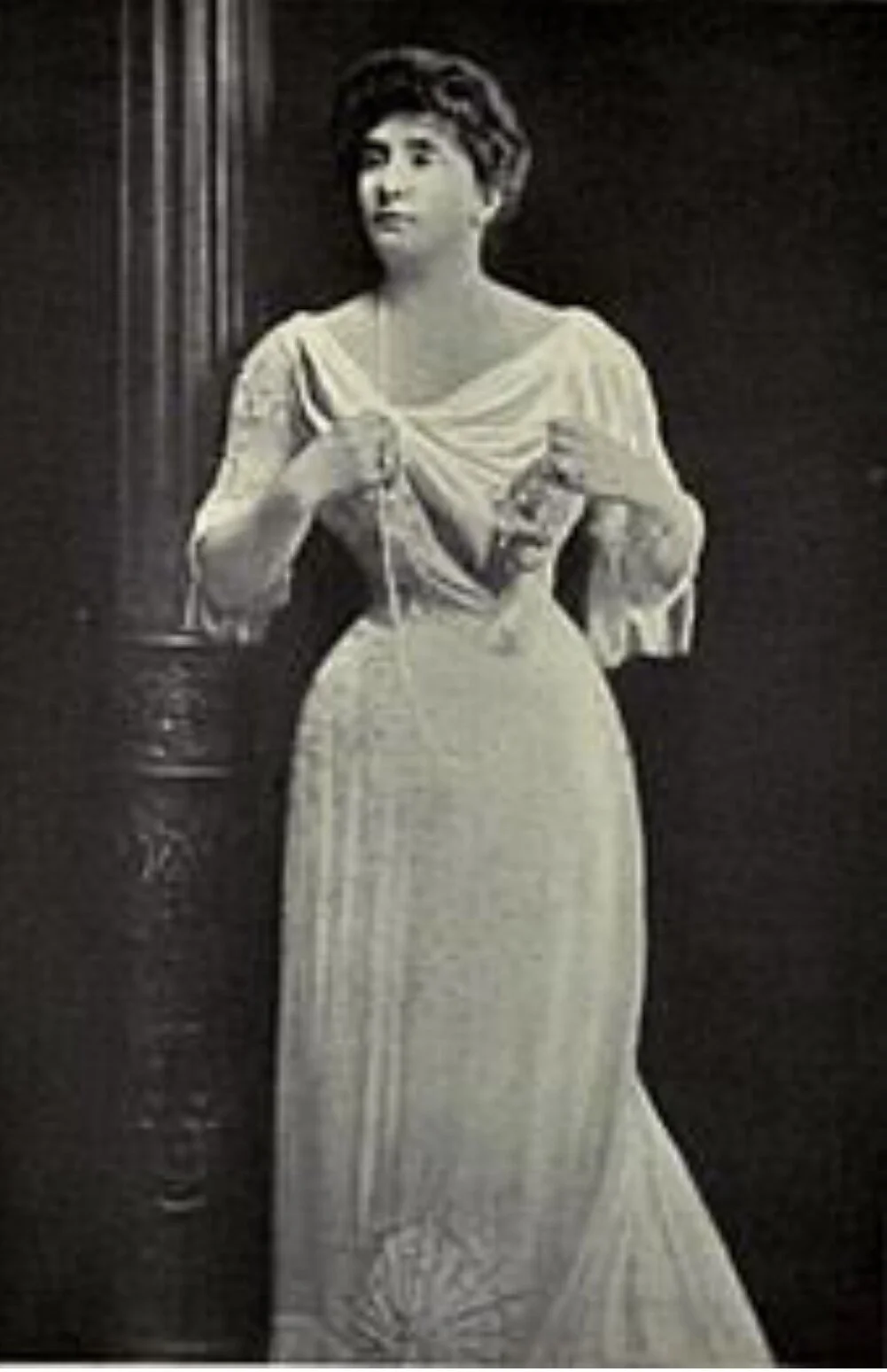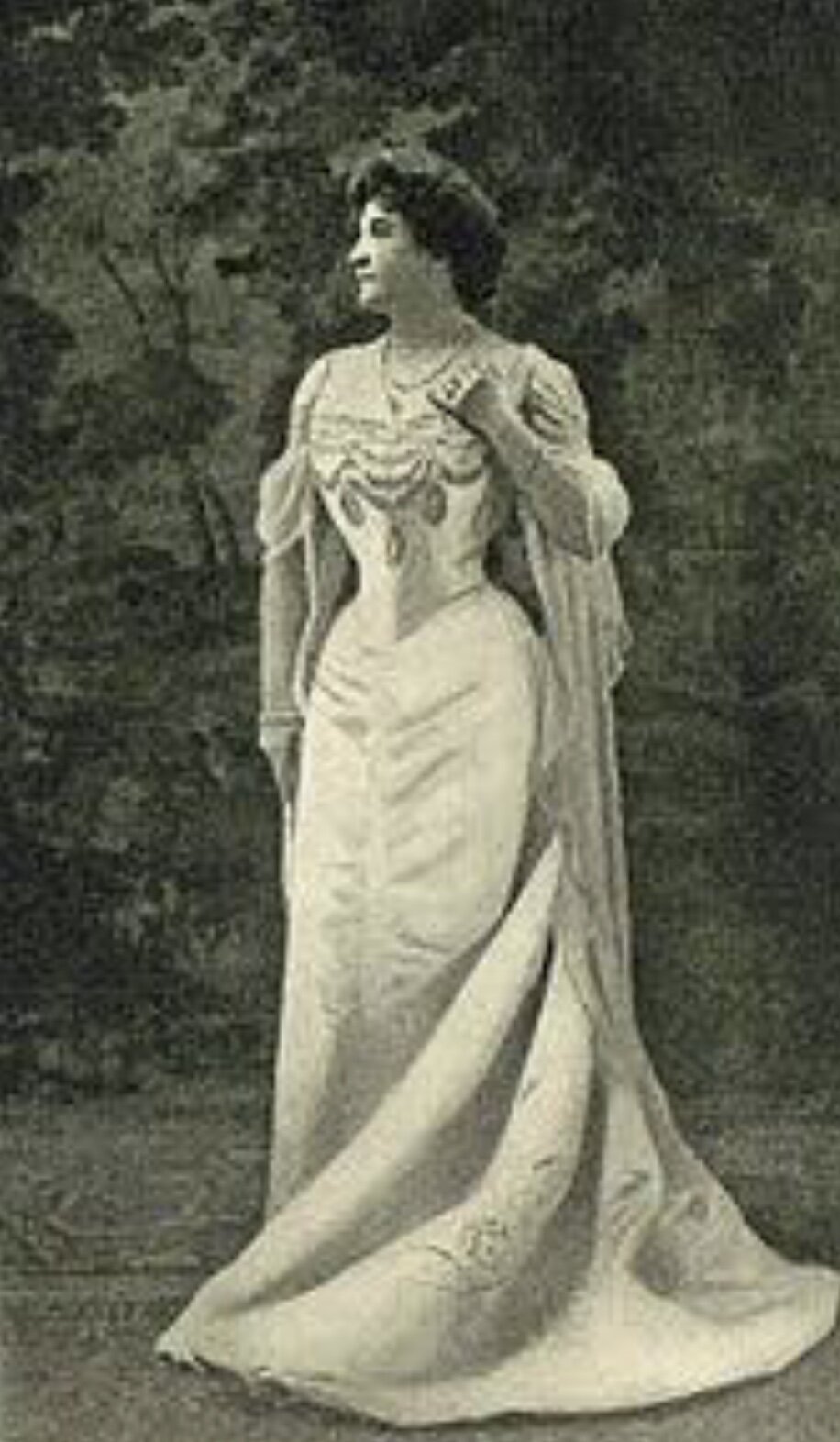Nellie Melba: A Calendar of Song: The Fourth Day of Christmas
A Calendar of Song: The Fourth Day of Christmas
No, this one will be the item that most of you dislike.
I’m coming back to the subject of purity. Some voices achieve purity by omitting texture: in particular, some voices, by avoiding using the chest register, tend to sound undernourished, pallid in the lower regions. Other voices, often wonderful and highly sophisticated, sound pure only to some listeners.
But here’s a famous singer whose vocal purity was always part of her legend, though she certainly employed her chest register: Nellie Melba (1861-1931). Her voice shone angelically, was seamlessly equalised through its range, and was capable of brilliant coloratura. She came nearer technical perfection than any other singer. (Sure, a few technical faults can be found, but few and slight.) Late in her career, when the accompanist Ivor Newton complimented her on her phrasing, she remarked “That is why I am Melba.” She also made great effects in simpler music, some of it in traditional songs.
She was not an angelic person, though: she was ambitious, powerful, controlling, wielding immense power at Covent Garden and other opera houses from 1889 up to her retirement in 1926. (A bust of her still stands in one of Covent Garden’s foyers.) She performed for the crowned heads of the United Kingdom, Germany, Sweden and Norway, and Russia; she toured from New York to New Zealand. But she also studied most of her roles with their composers - Verdi, Gounod, Thomas, Saint-Saëns, Massenet, Puccini - and had a reputation for continuing to sing their music as they had advised her. (There’s one phrase in La Traviata - “un unico raggio di bene” in the Act Two duet with Germont père - where her recording makes more sense of Verdi’s dynamic markings than anybody else’s ever has.) She tended never to revise the way she sang her music. Caruso, who often sang with her, recorded five accounts of the aria “Celeste Aida” that are all different interpretations of the same music, suggesting that his art was constantly in a state of organic evolution – but Melba recorded several arias and songs two or three times without showing any new insights. Some of her recordings show intense emotion; few of them show particular spontaneity.
A fault that matters more to our generation than to hers is her thoroughly imperfect French accent. This didn’t bother Gounod, Thomas, Massenet, Saint-Saëns, Delibes and other French composers: for them, it was enough that, despite her Australian accent (she was born Helen Mitchell over there) she made the words thoroughly clear. She had great successes in Paris and Brussels. (She also had a big affair with the Duke of Orléans, a claimant to the throne of France and great-grandson of King Louis-Philipppe. My sources don’t reveal which language they conversed in. She was married at the time to a fellow-Australian, Charles Armstrong, by whom she had had a child. Armstrong filed for divorce, trying to name the Duke as co-respondent.)
Have I put you off her completely? This recording, made in 1909, may leave you cold - but it haunts me, stings my eyes with tears, and brings a pang to my heart. I choose it because I think it shows purity of several different kinds, all of them expressive.
This is “D’une prison” (“From a prison”), a poem written by Paul Verlaine in 1880 and composed as a song by Reynaldo Hahn in 1892. Verlaine had spent eighteen months in prison in 1873-1875. In one of the great homosexual scandals of the nineteenth century, he, a married man who had neglected his wife in favour of the young poet Arthur Rimbaud, had wounded Rimbaud by shooting him (he was prosecuted for attempted murder). Verlaine (1844-1896) didn’t suffer remotely as badly as Oscar Wilde did (over twenty years later), but the whole case was celebrated. Reynaldo Hahn (1874-1947) had begun composing highly successful songs in his teens, including this. Whether or not he was yet aware of his homosexuality when he composed this one, he soon afterward became the only real lover of Marcel Proust (and an important influence on his fiction) and a longterm friend.
But I don’t mean to make this out to be a piece of gay agenda; it’s not, or only tangentially. The emotions involved are pure and sad. Hahn makes the first two verses into a resigned chant. (The sky I see over there above the prison roof is so blue, so calm; everyday life out there has its everyday pleasures and sorrows. But I’m stuck in this prison.) Then the singer changes tune and subject. (My God, my God, life’s out there, simple and peaceful.) And then changes tune and subject again, as Verlaine addresses himself as the prisoner. (What have you done - you prisoner, in tears - with your youth?) Then back to the beginning. (The sky over there is so blue, so calm.)
Everything here - despite the invocation of beauty and peace - is so desperately sad; or rather so sanely and calmly sad. Other singers overlay this song with emotion, with vibrato and even with portamento. Melba - who could turn on the emotion, and who certainly applied portamento where it was stylish - makes this song so simple. And the purity of her voice distinguishes keenly between the wan resignation of the opening and the more direct exclamation and question later:
https://www.youtube.com/watch?v=nJJHlnqBmvw
D’une prison
Le ciel est, par-dessus le toit,
si bleu, si calme !
Un arbre, par-dessus le toit,
berce sa palme.
The sky, over the roof, is
so blue, so calm!
A tree, over the roof,
is rocking its fronds.
La cloche, dans le ciel qu'on voit,
doucement tinte.
Un oiseau sur l'arbre qu'on voit
chante sa plainte.
The bell, in the sky that you see,
gently rings.
A bird on the tree that you see,
plaintively sings.
Mon Dieu, mon Dieu, la vie est là
simple et tranquille.
Cette paisible rumeur-là
vient de la ville.
My God, my God, life is there,
simple, and sound.
That peaceful murmuring there
comes in from the town.
Qu'as-tu fait, ô toi que voilà
pleurant sans cesse,
dis, qu'as-tu fait, toi que voilà,
de ta jeunesse ?
What have you done, you
now shedding endless tears,
tell me, you there, what have you done,
with your youth?
Le ciel est, par-dessus le toit,
si bleu, si calme !
The sky, over the roof, is
so blue, so calm!
I love the amazing steadiness of her sustained notes, almost vibrato-free, in the first two stanzas (“ciel”, “bleu”, “calme”; “arbre “, “palme”; “tainte “, “plainte”): everything is wan, tranquil. (She always has vibrato, but here pares it back to her minimum.)
The new intensity she applies for “Mon dieu, mon dieu”! and then the washed-out simplicity of “La vie est là” – these just slay me.
I also love the quiet naturalness of her chest register, especially in “Cette paisible rumeur-là/ vient de la ville”).
The climax is the “Qu’as-tu fait” stanza - but Melba; though applying more vibrato here, keeps even this in proportion. The stanza’s end tells us that it was heading for hopelessness all along; so does Melba's phrasing. Throughout the song, almost every line has ended in a diminuendo: here too.
And then the return to the opening: “Le ciel est, par-dessus le toit.” The final phrases, “si bleu,” “si calme”: perfectly prolonged and steady, but without emphasis or emotion.
It’s odd how one’s feeling about Melba’s voice itself changes throughout the song. What starts out like childlike simplicity – like the blue sky she’s describing - turns out to have so many subtleties of feeling. Those touches of chest register, the bright glow of the most emphatic phrases, the repeated fadings, all make different and cumulative impressions. This is such a simple song; Melba is showing us a very small percentage of what she can do. Yet the thought within the song is always moving forward, albeit within the numbed immobility of imprisonment.
Tuesday 29 December


